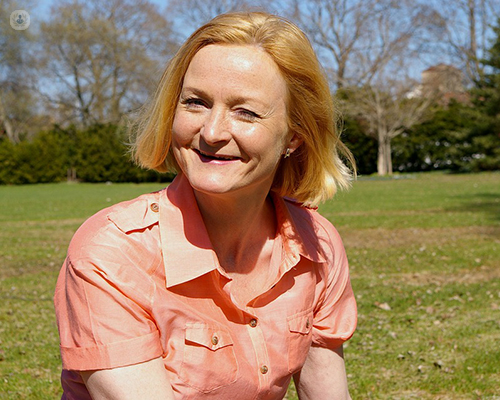The menopause: An essential guide
Escrito por:
The menopause is something that all women go through. This article explains everything we need to know about this time in a woman’s life.

When should women see a doctor about the menopause?
It's a common myth that we have to wait until our symptoms get severe before we go to see a menopause doctor. Seeing a doctor and starting hormone replacement therapy (HRT) when your symptoms are mild is very effective and actually very safe. We know that starting HRT before the age of 50 carries no extra risks. I often give women a trial of HRT in the early days to see if it makes a difference to their symptoms.
Which symptoms of the menopause tend to be the most troublesome?
There is a whole range of symptoms that accompany the menopause, and it does vary between women. The most common ones are hot flushes and mood swings. Psychological symptoms are also extremely common. In my experience, women can find brain fog to be the most troublesome symptom. Low mood and anxiety are also very common.
Sometimes, I see women who have managed the physical symptoms such as the hot flushes, but it's really the low mood and the anxiety that they find much more disabling.
How has HRT and other medication used to treat menopause symptoms advanced in recent years?
It has changed hugely in the last 20 years. What we were prescribing 20 years ago is very different to what we are prescribing now. A lot of the studies done were based on the older forms, the more synthetic forms, which carried much higher risks.
What we tend to use now as a first line is body identical hormone replacement therapy. This carries a much lower risk of breast cancer, with no increase in risk for the first five years of use.
We also have the transdermal preparations of HRT, such as the patch, the gel and the spray, which carry no risk, or very minimal risk of blood clots. It is now very safe. If you are using body identical hormone replacement therapy, there's no increased risk of breast cancer in the first five years of use.
Thereafter, if you're using a combined hormone replacement therapy, which is progesterone and oestrogen, the risk is something along the lines of an extra one in a thousand cases.

Are there alternative forms of treatment wich can help with symptoms of the menopause?
I always recommend diet and lifestyle as my first line if you have mild symptoms that haven’t had a big impact on your lifestyle. Some women opt for herbal therapies. Red clover is quite a good one. It can help ease symptoms because it contains phytoestrogen.
However, the most effective means of treatment is hormone replacement therapy. Many women will find herbal treatments are not sufficient for their symptoms. Acupuncture can help many women as well. Some women find that the combination of acupuncture and other things quite useful. Mindfulness and cognitive behavioural therapy can help ease your symptoms as well.
Are there any dietary or lifestyle changes women can make to help keep them feeling well during the menopause?
Absolutely. In the menopause, we start to experience a transition which can lead to a decrease in our bone mineral density and an increase in our cardiovascular risks.
So, the lifestyle changes that I always recommend are eating a Mediterranean diet, weight loss, exercise, and making sure you're having enough calcium and vitamin D in your diet to strengthen your bones.
Generally, make sure you're taking time out for self-care. It's a time where our stress hormones, such as cortisol, can go up quite a lot. To keep these hormones nice and level, I always recommend general timeout and self-care.
If you would like to talk to see a doctor to discuss your menopause symptoms, and possible treatments, don't hesitate to book a consultation with a menopause specialist today.



